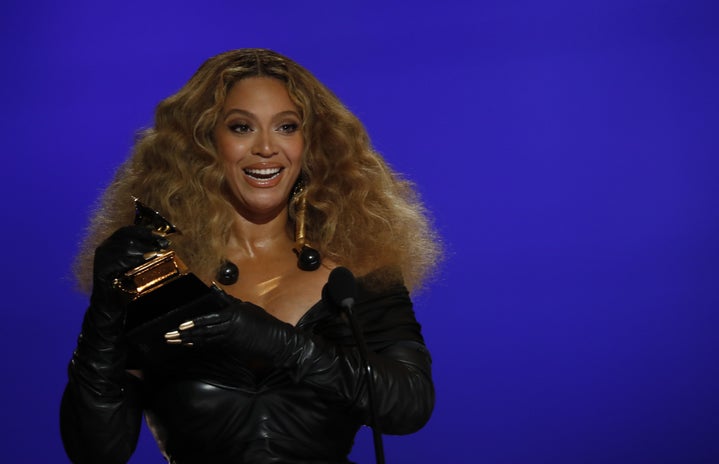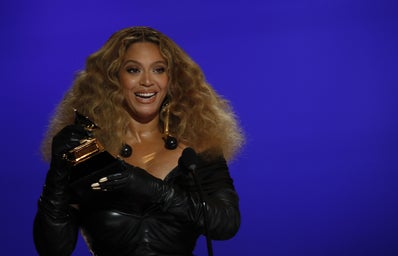The Grammy Awards are awards presented by the Recording Academy of the United States to recognize outstanding achievements in the music industry. Once regarded by many as the most prestigious and significant awards in the music industry worldwide, the Grammys are now struggling to find relevance and lack in appreciating true outstanding achievements.
The Grammys organization has constantly drawn industry ire and criticism in the recent years for a number of different instances: from Beyonce losing the ‘Album of the Year‘ (again) to Harry Styles, to allegedly making last-minute A-list additions to its nominations, to Canadian superstar The Weeknd boycotting the Grammys after his After Hours album— including smash hit “Blinding Lights”, which Billboard observed as the most successful song in Hot 100 history— received zero nominations at the 2021 ceremony.
Yes, Beyonce also made headlines for winning the greatest number of Grammy awards and The Weeknd set the Guiness World Record this year for being the most popular entertainer in the world. Our question is, with all their accomplishments, why aren’t recognized where it matters?
The Recording Academy recently announced a change to the rules that inspired the latter’s boycott, which was the elimination of the secret nomination-review committee. Pop star The Weeknd said he still won’t submit his music for Grammy consideration, citing an ongoing lack of trust in the award show’s process.
“I think the industry and public alike need to see the transparent system truly at play for the win to be celebrated, but it’s an important start,” he continues. “I remain uninterested in being a part of the Grammys, especially with their own admission of corruption for all these decades. I will not be submitting in the future.[sic]”
Abel Makkonen Tesfaye (The Weeknd)
While there was no stated “admission of corruption” from the Grammys in announcing the rule change, in an interview with Variety late Friday, interim Grammy chief Harvey Mason Jr. said he had been working to eliminate the committees for months before the Weeknd snub.
“Any time an artist, especially one of that stature, calls our process into question or thinks something is unfair… the Academy is of course going to be affected by that, and want to work to make things better,” Mason said.
Drake had also come out in support of The Weeknd and said,
“I think we should stop allowing ourselves to be shocked every year by the disconnect between impactful music and these awards and this is a great time for somebody to start something new that can be build up over time and be passed on to the generations to come.[sic]”
Aubrey Drake Graham (Drake)
What once was the highest form of recognition no longer matters to the artists that exist now and might not even to the ones that come after. People believe that the Grammys speak an old, old language and need to get new younger founders who tapped into culture worldwide. Two-time Billboard Music Award for New Artist of the Year winner Zayn Malik has also expressed his frustration over the voting process and the lack of transparency behind it as well as the lack of inclusion of different kinds of artists in a space that “allows favoritism, racism, and networking politics to influence the voting process.” In 2021, Kanye West had also come out in solidarity and said,
“When you keep on diminishing art and not respecting the craft and smacking people in their face after they deliver MONUMENTAL feats of music, you’re disrespectful to inspiration.”
Kanye West
One of the entertainment industry’s cardinal sins— and one that ruffles fans’ feathers the most— is clout chasing. When BTS lost in 2021, ARMY lobbed accusations at the Grammys for using BTS as eye candy to increase viewership, trending #scammys for days after the broadcast. The reaction is understandable: BTS has been lauded with critical and commercial success, including earning awards at other ceremonies, but has been steadfastly sidelined by the Grammys in the States. It’s a tough accusation to prove, but an even harder one to argue against. 2021’s Grammys marketing plan appeared to have been built on the bedrock of BTS and their legendarily devoted fan base. Their names and faces were splashed across ads in the weeks leading up to the event, and nearly every commercial break in the almost four-hour-long program promised: “Coming up next: BTS!” But the thing is, they weren’t coming up next; they were coming up last. The group’s performance was the broadcast’s finale, closing out the show altogether. What’s more, BTS’s nomination category wasn’t even included in the live broadcast but instead appeared in the internet-streamed pre-show, which all but ensured that fans would be stuck to their screens for a number of hours, waiting for the big onscreen moment to come. The move was denounced by ARMY as a slick way of juicing the Grammys’ viewership numbers—precisely the ones that have been plummeting for years. BTS’s snub wasn’t the first time the Grammys has been accused of being racist or xenophobic. The Recording Academy has a suspicious track record of passing over artists of color for their white counterparts.
People have noticed a lack of gender and racial diversity within the winner’s circle. There’s also that troubling list that recirculates every year, of highly successful artists— Black artists, especially—who have never received a Grammy award, a stark reminder of how far the accolades is from cultural relevance and diversity. Tupac Shakur, considered by many to be the greatest rapper of all time, earned six nominations but never won, and the same with Notorious B.I.G. Snoop Dogg has 16 nominations but no wins. Many award shows have this problem, where the unconscious and conscious racial bias is so deeply ingrained in our culture that there has never been a moment of introspection. There’s so much of an institutional, systemic foundation with the way that minorities have been set up to fail qualitatively in music.
When we talk about the way music is measured, the metric that we use is sales. How do you ‘sell’ when you are being systematically held back? Whether it be the promotional budget isn’t there, the label isn’t investing in you, you aren’t getting the same touring budget or music video budgets as other artists, or the radio won’t play your songs because you’re singing something that’s considered different. That is the legacy and history of this business that has to be unpacked. When renowned creations by racialized artists are only honored in the categories coded for their respective races and systematically passed over time and time again for mainstream recognition, this belies an in-built bias that precludes non-white excellence from being considered on the same terms as white excellence. Many well-meaning people often have a hard time understanding what systemic racism looks like—this is what systemic racism looks like.
The Grammys considers itself to be a prestigious industry awards ceremony, but with so many blind spots, is it really Music’s Biggest Night?


